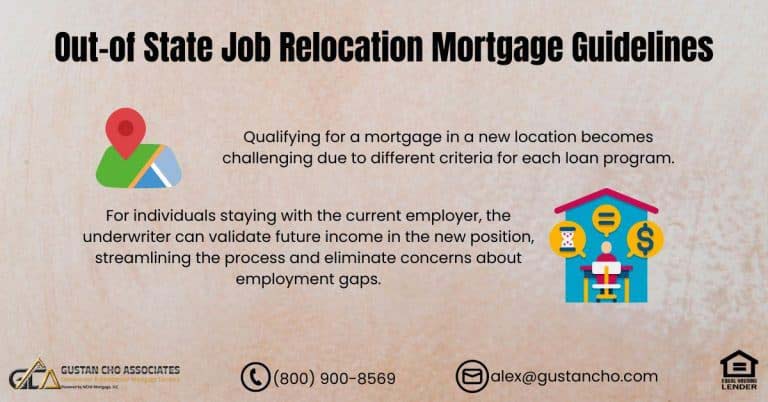This article delves into the lending prerequisites and regulations concerning mortgage with new job. It addresses the misconception that one must have a two-year job history to qualify for a mortgage loan. Contrary to this belief, it’s not a strict requirement. Many prospective homebuyers might have been turned away by lenders who insist on this two-year work history.
However, such buyers must know that alternative options exist. They can explore other lenders or seek assistance from specialized services like ours. It’s possible to secure a mortgage even with a recently acquired job. It’s important to note that most lenders have additional criteria, known as mortgage overlays, which applicants must meet. These overlays might vary from lender to lender.
Overlays are when the particular mortgage company may have their own lending requirement with the 2-year employment requirement on the same job.
Neither HUD nor Fannie Mae’s guidelines stipulate that borrowers cannot qualify for home loans due to gaps in employment. In fact, individuals can still secure a mortgage even with a recent change in employment. As a mortgage professional, I routinely approve and finalize loans for applicants who have experienced employment gaps or have recently started a new job.
This demonstrates that eligibility for a mortgage is not solely determined by a consistent employment history but rather by various factors that lenders consider during the approval process.
Applying For A Mortgage With A New Job? Click Here.
Gaps In Employment In Past Two Years
Individuals who have recently changed jobs can still qualify for a mortgage. It’s a common misconception that obtaining a mortgage with new job is an impossible challenge. Still, lenders often extend this opportunity to those who have recently secured employment after unemployment lasting six months or less.
The key factor here is demonstrating stability and the ability to meet financial obligations, which can be achieved by providing the lender with 30 days’ pay stubs.
While having a two-year employment history is typically a requirement for securing home loans, it’s important to clarify that this doesn’t necessarily mean being employed by the same employer for the entire duration. Rather, lenders are primarily interested in assessing an individual’s overall employment stability and income consistency over the past few years.
This means that individuals who have switched jobs or had brief periods of unemployment can still meet this requirement if they provide evidence of steady employment and income during that timeframe.
To illustrate this point, let’s consider a hypothetical scenario where an individual has recently landed a new job after being unemployed for a few months. Despite this recent change, they can still qualify for a mortgage if they demonstrate a solid employment history and provide the necessary documentation to support their financial stability.
By meeting the lender’s requirements and demonstrating their ability to manage their financial responsibilities, individuals can successfully obtain a mortgage even with new job.
- Borrowers who recently got a full-time job in 2023
- Have been unemployed in 2021 and 2022
- Can prove they were employed in 2019 and 2020
- Employment in 2019 and 2020 should reflect borrower had a two-year employment history
- Borrowers could have had multiple jobs also
- Gaps in between are fine as long as they have a record of a 24-month overall employment history
If you’ve recently started a new job and are seeking a mortgage, there are specific requirements you’ll need to meet. Typically, lenders request 30 days of paycheck stubs as proof of stable employment. However, this requirement can be waived if you provide a written employment contract or offer letter.
This exception is crucial, especially if you’ve been unemployed for six months or more and have just begun a new job. In such cases, you must demonstrate that you’ve been continuously employed in this new full-time position for at least six months to qualify for a conventional loan. To bypass the usual six-month waiting period, it’s essential to furnish your lender with a copy of your employment contract or offer letter.
You can expedite the mortgage application process by presenting your employment contract or offer letter, especially if you’ve recently transitioned into a new job. This documentation serves as evidence of your employment stability and can help mitigate lenders’ concerns regarding your recent job change.
Ultimately, while lenders typically require a 30-day history of paycheck stubs to verify income, exceptions exist for individuals in situations like yours, where recent employment changes occur. Providing your employment contract demonstrates your commitment to your new job and can increase your chances of securing a mortgage without adhering to the standard waiting period.
Can I Get Approved For a Mortgage With a New Job
Securing approval for a mortgage with new job is feasible yet potentially more demanding than an established employment record. Lenders generally favor applicants with consistent income streams, presenting a hurdle for those transitioning into new roles. However, there are strategies to bolster your prospects in such circumstances:
- Demonstrating stability beyond your recent job change can reassure lenders. This might involve highlighting a strong credit history or significant savings.
- Showcasing a promising career trajectory or industry demand can mitigate concerns regarding your job transition.
- When changing jobs, providing transparent and thorough documentation reassures lenders of financial stability and the ability to meet mortgage obligations.
By proactively addressing these considerations, you can enhance your chances of obtaining a mortgage despite starting a new job.
Click Here To Get Approved For A Mortgage With New Job
Wait for a Probationary Period
Lenders generally favor applicants who have completed their probationary period in a new job, usually spanning 3 to 6 months, as this demonstrates job stability, a critical factor in mortgage approval. A favorable credit score significantly enhances your likelihood of securing a mortgage. Maintaining a healthy credit report through timely bill payments and reducing outstanding debts is essential.
Ensure that your new job provides sufficient income to meet the lender’s requirements for mortgage approval. Lenders typically want your debt-to-income ratio to be within a certain range.
When applying for a mortgage with new job, expect to furnish documentation validating your employment status, such as an employer’s letter, pay stubs, or an employment contract. A substantial down payment can bolster your attractiveness as a borrower, mitigating lenders’ apprehensions about your recent job change. This down payment not only strengthens your application but also serves to offset concerns associated with your transition to a new position.
Shop Around For Best Rates and Terms
Lenders often have diverse criteria for applicants with new jobs. It’s wise to explore various mortgage options from different lenders to identify the best fit for your circumstances. If your new job doesn’t meet the requirements, consider applying with a co-borrower with a more stable income.
In addition to your employment history, lenders will consider your overall financial situation, including your savings, investments, and other assets.
It’s crucial to recognize that each lender sets its policies and criteria, so consulting with multiple lenders is advisable to determine your eligibility for a mortgage with your new job. Consulting a mortgage broker can help you navigate the lending process and find the best mortgage solution for your individual needs.
Recent College Graduates Qualifying For Mortgage With New Job
Full-time college students or students from an accredited technical school, the two-year employment history requirement is waived in lieu of providing lender college transcripts or technical school transcripts. Recent college graduates will get approved for a mortgage with a new job.
Homebuyers who have recently graduated from a college and/or technical school can start the mortgage approval process the day they get a full-time job. However, those with a new job need to provide 30 days of paycheck stubs before they can close on a home.
For full-time college students or those from accredited technical schools, the typical two-year employment history prerequisite is substituted with the provision of lender college or technical school transcripts. This means that recent college graduates can still secure approval for a mortgage with new job.
Once they land a full-time position after graduation, they can initiate the mortgage approval process immediately. However, individuals with a new job must furnish 30 days’ paycheck stubs before finalizing the home purchase. This streamlined process allows recent graduates to transition smoothly into homeownership without the burden of a lengthy employment history requirement.
What Income Will Be Used If I Go From Part-Time To Full-Time Employment
If borrowers are initially employed part-time but are promoted to full-time status within the same company, their full-time income can be considered for their mortgage application. However, lenders typically require verification of this transition to ensure the stability of the borrower’s employment. This verification often takes the form of written confirmation from the employer regarding the change to full-time status.
Under the Ability to Repay Mortgage Guidelines, lenders must assess the borrower’s ability to repay the loan, considering factors like income and debt-to-income ratios. In this scenario, the borrower’s new full-time income will be utilized for this assessment rather than averaging with their previous part-time income. This approach ensures borrowers qualify for their mortgage based on their current financial situation and employment status, providing a clearer picture of their ability to meet mortgage obligations.
Mortgage With New Job: What If I Go From 1099 Income Status To W-2 Income Status
Borrowers categorized as 1099 wage earners typically require a consistent two-year history of 1099 income to meet the qualification standards for obtaining a mortgage loan. However, there may be flexibility in certain cases, where approval for a mortgage loan with just one year of 1099 income could be possible if the application receives approval or eligibility through systems like Freddie Mac’s Automated Underwriting System or LP FINDINGS.
Specifically, Freddie Mac does permit consideration of one-year 1099 income under certain circumstances. This leniency may apply when the mortgage applicant possesses a robust credit score and financial profile, and the Automated Underwriting System Findings stipulate only one year of tax returns as sufficient documentation.
Consider the following scenario: A borrower has recently transitioned to 1099 wage status and is seeking a mortgage. While traditionally, two years of 1099 income would be necessary for qualification; there is potential for approval with just one year of documented income if the borrower demonstrates strong financial credibility and the automated underwriting systems concur.
This highlights the importance of individual financial circumstances and the role of automated underwriting in determining mortgage eligibility, particularly for borrowers with a new job under the 1099 classification.
- Borrowers with a new job as a W-2 wage earner
- Went from 1099 to W2 earner
- This type of borrower will qualify for a mortgage loan based on new W-2 monthly gross income
- May apply for a mortgage loan the day they start a new job
But cannot close on mortgage loans until they have provided mortgage lenders 30 days of paycheck stubs.
FAQ: Mortgage With New Job Lending Requirements and Guidelines
- Can I qualify for a mortgage with new job? Absolutely! Contrary to common belief, you don’t necessarily need a two-year job history to secure a mortgage loan. Many lenders offer opportunities for individuals who have recently started a new job. By demonstrating stability and the ability to meet financial obligations, you can increase your chances of mortgage approval.
- What are mortgage overlays, and how do they affect my application? Mortgage overlays are additional criteria set by individual lenders. These criteria might vary from lender to lender and could include requirements like a two-year employment history. However, it’s essential to explore different lenders or specialized services to find options that suit your circumstances, especially if you’re navigating a recent job change.
- Can I get approved for a mortgage if I’ve recently changed jobs? Yes, you can still qualify for a mortgage even if you’ve recently switched jobs or experienced brief periods of unemployment. Lenders primarily assess your overall employment stability and income consistency over the past few years rather than focusing solely on the duration of your current job.
- What documentation do I need to provide if I’ve just started a new job? If you’ve recently transitioned into a new job, you may need to provide documentation such as pay stubs, an employment contract, or an offer letter to demonstrate your employment stability. This documentation helps reassure lenders of your ability to meet mortgage obligations despite the recent job change.
- Can recent college graduates qualify for a mortgage with a new job? Yes, recent college graduates can still secure approval for a mortgage with a new job. Typically, the requirement for a two-year employment history is waived in favor of providing college or technical school transcripts. However, individuals with a new job must provide 30 days’ paycheck stubs before finalizing the home purchase.
- What if I go from part-time to full-time employment? If you transition from part-time to full-time employment within the same company, your new full-time income can be considered for your mortgage application. Lenders will typically require verification of this transition, such as written confirmation from your employer regarding the change to full-time status.
- How does transitioning from 1099 to W-2 income status affect my mortgage application? If you transition from being a 1099 wage earner to a W-2 wage earner, you may qualify for a mortgage loan based on your new W-2 monthly gross income. However, you may need to provide 30 days of paycheck stubs before closing on the mortgage loan, depending on the lender’s requirements.
If you have any questions Mortgage With New Job Lending Requirements and Guidelines, please contact us at Gustan Cho Associates at 800-900-8569. Text us for a faster response. Or email us at gcho@gustancho.com. The team at Gustan Cho Associates is available 7 days a week, on evenings, weekends, and holidays.
This blog about Mortgage With New Job Lending Requirements and Guidelines was updated on February 8, 2024.











Need no overlay Fha mortgage will put down 10% middle score of 545 have charge offs and collections as well
I agree 100% to look into this.
If we are not banking these rough loans and we can make an additional $1000 on each loan charge to the customer lets do it! We are leaving a lot of money on the table and these customers can scram together $1000.00 to get a loan done.
Cindy, I still want to talk to the contract processor referred from Dan of Carrington. We cannot have eggs in one basket and need to diversify. Please relay the information to Massimo and Peter on the conference call we had with Mendy Burg. We need to set a conference call with Massimo, you, Peter, me. Loan Cabin can save over $250,000 a year in processing costs annually if we use our heads and use this new independent contract processing business model. Like we discussed, we need to give benefits on these savings to LC, Gustan Cho Associates, and the Loan Officer. Need to be fair. Lets all be on the same page and be team players.